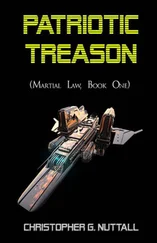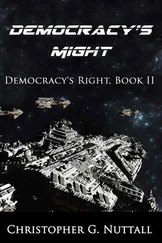“Hail them,” she said, quietly. She took no pleasure in mass slaughter of helpless men and women, even if they were on the wrong side. “Inform them that we will accept their surrender under the terms and conditions of the Moscow Accords.”
The thought brought back memories of her own period as a prisoner of war. Admiral Wachter had treated her and the remainder of the POWs well, against orders from the Thousand Families. She hadn’t realised until after the Fall of Earth just what the Thousand Families had had in mind for her, but she’d been supremely grateful to Joshua for saving her people. They would have been given to the mind techs and, after having been made to betray the rebellion, would have been sold as pleasure slaves. She’d had nightmares for months afterwards.
“No response,” the communications officer said. There was a long pause. “I am unable to even locate any ship-to-ship communications traffic.”
“Lasers, then,” Katy said, grimly. It wasn’t uncommon for starships to rely solely on lasers to communicate, but in a war situation it was generally regarded as a sign of hostile intent. It had always baffled her that the Imperial Navy used such a system, when it was impossible to prove that starships were using lasers to communicate or were just being silent, but it was doctrine and therefore not to be questioned by mere mortals. Rewriting the Imperial Navy Regulations, massive volumes covering every problem the Imperial Navy had encountered or was likely to encounter, was going to take years. There were times when she thought that it would be easier to burn the volumes and start again. “Tactical, lock weapons on targets and prepare to open fire.”
The enemy ships didn’t wait. As soon as she slipped into firing range, they opened fire, belching out a pitiful salvo of barely two hundred missiles, locked on her ship. She tensed, wondering if they had located her flagship, before realising that it had to be coincidence. Their only hope was to inflict enough damage to put her off carrying out further raids. She watched as the red icons mounted, slipping into an attack profile that would give them their best chance at getting a handful of missiles through her defences, and winced. It wasn’t going to work.
“Fire,” she said, calmly.
The superdreadnaught shuddered as it belched out its first salvo. The firepower of the Jefferson alone outmatched the firepower of the entire enemy fleet… and it was combined with the firepower of eight other superdreadnaughts. She’d held the arsenal ships in reserve, expecting the enemy ships to target them first, but they’d chosen to focus on her superdreadnaughts. She wasn’t sure if she admired their decision or not, but it made her angry. It was throwing away good men and women for nothing.
Idiots , she thought, wondering if it showed how Admiral Wilhelm’s government really worked. If they were that scared to break contact and escape — and they’d had enough of an opportunity to escape when she’d first arrived — what would he do to them if they lost the battle? It wouldn’t matter to them personally — only a miracle would save them now — but how would Admiral Wilhelm treat surviving losers? Admiral Percival would have punished them for the cardinal sin of losing a battle, making his people reluctant to admit that they couldn’t win… or willing to rebel.
The first wave of enemy missiles lanced into the teeth of her point defence and started to expire. The massed point defence of every superdreadnaught, and her escorts, could be deployed to protect her ships, with nothing whatsoever having to be held back to protect the remaining ships, which weren’t under attack. She realised, as missile after missile flickered and vanished into a puff of ionised plasma and dust, that she’d overestimated their penetration aids. They were being wiped out and her ship wasn’t even going to take a hit. The enemy were firing again, and again, but they weren’t even combining their salvos… and she suspected that even if they had, they would have done no good. They simply didn’t have the firepower to punch through her defences.
Her missiles roared into them and slammed home. Battlecruisers were tough, but they’d never been designed to stand up in the wall of battle, let alone stand off superdreadnaught-sized volleys of missiles. One by one, they exploded and died, barely having time to get even a handful of their crew off before they were destroyed. The cruisers and destroyers vanished just as quickly, their point defence trying desperately to save them from certain annihilation, only to fail. Explosions ripped through their formation and every successive death only made the next one more certain. Five minutes after they had opened fire, the last ship exploded and died.
“Opening hailing frequencies,” Katy ordered, her voice coldly furious. At least a hundred thousand people had just died at her command and, as far as she was concerned, their deaths had been completely unnecessary. They shouldn’t have had to die like that when they could have surrendered, rather than being committed to hopeless battle. She hoped, with a fury that surprised her, that their commanding officer was even now burning in hell. He had failed his crews spectacularly.
She waited for the communications officer’s nod. “This is Admiral Garland, commanding 2 ndFleet,” she said, coldly. She had considered embracing a different designation — Task Force Vengeance, perhaps — but it would only have confused people. That might not have been a bad thing, but they were close enough to the planet for the sensors to get an accurate read of each ship’s unique drive field. “I have just engaged and destroyed your defence fleet and I intend to destroy the planetary defences and supplies.
“I am hereby ordering you to evacuate your defence platforms and supply dumps now,” she continued. “I will open fire in precisely ten minutes. Any attempt to engage my fleet or to transport supplies down to the planet will result in the deadline being cancelled and destruction commencing at once. I repeat, you have ten minutes to abandon the facilities before I destroy them.”
She watched, coldly, as the fleet settled down into attack position. The arsenal ships with their long-range missiles could destroy the supply dumps without having to dive into the gravity shadow, making escape easy if the destroyers managed to summon reinforcements from another system. There was very little point in actually destroying the planetary defences — they were outdated and, these days, effectively useless — but she’d included them in her threat anyway. They could evacuate the entire orbit of the planet… if they started at once and used life pods. They shouldn’t have had time to think about trying to save anything from the supply dumps, although she doubted that they would have time to save anything. It would take more time than she intended to give them, by quite a large margin, to transport everything down to the surface.
The timer ticked slowly down as the asteroids came alive with shuttles and life pods, even primitive skydiving pods that would normally be held in reserve for the direst of emergences. She’d heard that some people liked riding the pods for fun, plunging down into a planet’s atmosphere in a fiery trail, but it seemed insane to her. There was quite enough risk in her life already.
“Zero,” the tactical officer said. The stream of life pods and shuttles was slowly drying up. “Admiral…?”
“Signal the arsenal ships,” Katy ordered. She didn’t recognise her own voice. “They may fire when ready.”
The arsenal ships had been running targeting scans all the time, locating the best places to target with minimal force. One of them belched a hail of missiles, firing down into the gravity shadow, right towards the asteroids. She had expected the defenders to leave their point defence on automatic and it wasn’t a surprise when the asteroids’ point defence started to engage the missiles, but there wasn’t enough fire to put more than a dent in the missile swarm. She’d wondered if they had gone to the expense of fitting the asteroids with force shields beyond the standard counter-radiation shields, but it seemed that they hadn’t. The sheer number of generators required to cover such large asteroids would have daunted almost anyone.
Читать дальше












